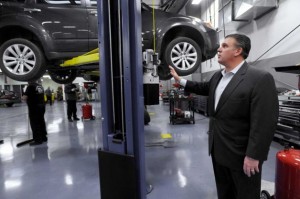Connecticut car dealers look to loosen automakers’ grip
BY DIRK PERREFORT
Hearst Connecticut Media
The price of floor tiles could doom a car dealership, and local officials are trying to make sure it doesn’t happen.
During the past few years, auto dealers around Connecticut have put an estimated $100 million worth of upgrades into their facilities, much of it driven by factory mandates to keep up with the changing face of carmakers’Â brands.
And while the changes can help dealerships keep up with corporate marketing strategies, they also require major investments for what they deem to be changes of little significance, such as the color of tile in a showroom.
A simple “refresh” in the industry can cost upward of $1 million for a local dealer, which is required to use suppliers chosen by the automaker. If it doesn’t comply with corporate demands, incentives that help the dealership be more competitive in the marketplace are often pulled from the table with little recourse.

- Colonial Subaru owner David Beylouni shows the service area in a newly constructed building for the dealership on Newtown Road in Danbury. Photo by Carol Kaliff
“Connecticut has one of the least-protective franchise laws in the nation,” said David Beylouni, the owner of several Colonial branded dealerships in Danbury and a board member of the Connecticut Automotive Dealers Association.
The association has been pushing for legislation currently before the General Assembly that would tighten laws regulating the relationship between auto factories and their dealerships in the state.
James Fleming, the president of the association, said the most important regulation requested is an eight-year moratorium on new renovation demands after a dealership has made a significant investment in its infrastructure.
“It’s really about giving the dealership time to recover the costs they expended as part of the renovation,” Fleming said. “We are also in negotiations with the manufacturers about allowing dealerships to purchase some of their supplies locally. There are millions of dollars spent by dealerships every year that could provide huge benefits to the state’s economy if they could use local suppliers and local vendors.”
While it makes sense for a factory to require a dealership to purchase signage from a specific supplier, Fleming said, demands to purchase glass, tile and other materials from suppliers chosen by the corporate parent can greatly increase the cost of a renovation project.
“Often these materials could be purchased locally for far less than the supplier the manufacturer wants the dealership to use,” Fleming said. “While we understand the need to purchase signage from specific suppliers due to brand image and copyrighting, whether the color of the tile is an exact match or a shade off doesn’t make that much of a difference.”
Beylouni, who recently invested more than $7.5 million in a new Colonial Subaru building off Interstate 84, said some of the demands could put smaller dealerships in financial peril.
‘Difficult to deal with’
Ted Orr, the owner of New Milford Volkswagen, earlier this month announced his dealership’s closure after more than 65 years in business. The closure, planned for the end of March, resulted from an issue with Volkswagen’s credit division, but Orr has said in the past that factory representatives would often make unwieldy demands, including revamped signage. At one point, a representative from the automaker ordered Orr to remove a 1955 Volkswagen Beetle on display in his showroom.
Bruce Bennett, who owns several franchises in the region, including Bruce Bennett Nissan in Wilton, said he left the Chevrolet franchise several years ago.
“I don’t want to bash the brand, but they were very difficult to deal with,” he said.
Bennett said the manufacturer was particularly prickly with warranty claims. Typically, when a dealership does service work covered by a warranty, the manufacturer pays for the repairs after a claim is submitted.
“You could tell something was wrong because they no longer wanted to pay warranty claims,” he said. “We had customers who had the same complaints.”
Fleming said that besides the eight-year moratorium on new infrastructure investments, dealerships in the state are also hoping to strengthen a host of other elements of the franchise agreements, including a restriction on audit look-backs to one year, except for extenuating circumstances such as a fraud investigation, or reimbursement for expenses if the manufacturer cancels the franchise agreement.
“We may not get everything we want in this bill, but we are moving closer to what other states have adopted,” Fleming said.
New Hampshire has a 15-year moratorium that’s already in place and New York has a 10-year moratorium.
“All we are asking for is eight years,” Fleming said. “We believe this is the year.”

- Officials with New Milford Volkswagen announced earlier this month that the dealership will be going out of business. Photo by Carol Kaliff
Compromise?
Manufacturers have already come to an agreement with the state dealerships on some of the items, including auditing procedures and warranty claim issues, but continue to negotiate on the eight-year moratorium and local sourcing proposals.
Dan Gage, the communications director for the Alliance of Automotive Manufacturers, said consumers should remember that car companies, according to state laws, are forbidden from directly selling the products they produce, requiring the dealer network.
“If the state wants to dictate terms between two private and willing entities, then it should be fair and balanced, and often franchise laws are not,” he said. “What we want is for our members to have an appropriate ability to influence the marketing, advertising and display of the product they create.”
Gage said that while manufacturers may be willing to provide some flexibility when it comes to local sourcing, marketing has become that much more important in a competitive industry, and certain elements have to be protected.
“Quality isn’t the kind of differentiating factor for the consumers that it once was,” Gage said. “The competition today has to do with styling, design and what additional technology and other amenities are being offered. Just like any retailer, manufacturers have a brand they have to protect. There are certain elements that need to be uniform if the manufacturer is going to protect the brand.”
Members of the Transportation Committee have until the end of next week to vote on the proposals if they are to move forward in the General Assembly.
State Sen. Toni Boucher, a ranking member of the Legislature’s Transportation Committee, said while the language has to be ironed out, she is supportive of the legislation.
“We have a lot of great dealerships in our area that have been working really hard to stay afloat during this difficult economic time,” she said. “I am very sensitive to that and want to do whatever we can to help them out.”
Hearst Connecticut Media includes four daily newspapers: Connecticut Post, Greenwich Time, The Advocate (Stamford) and The News Times (Danbury). See newstimes.com for more from this reporter.